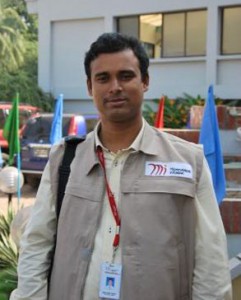Field Stories
In photos: A look at fortified rice distributed through social safety net programs in Bangladesh
December 7, 2023
WP_Term Object
(
[term_id] => 49
[name] => Field Stories
[slug] => all-field-stories
[term_group] => 0
[term_taxonomy_id] => 49
[taxonomy] => news-category
[description] => Discover the personal stories of people whose lives have been impacted by better nutrition, and those working tirelessly to deliver it.
[parent] => 0
[count] => 180
[filter] => raw
)
Strengthening the salt industry in Bangladesh: MI and BSCIC
When salt iodization was introduced in the early nineties and made mandatory in Bangladesh, it was a natural fit to make BSCIC the focal point for iodization efforts.
Posted on August 29, 2011
 The Bangladesh Small and Cottage Industries Corporation (BSCIC) is a government-owned corporation working to improve, promote and support small businesses.
The Bangladesh Small and Cottage Industries Corporation (BSCIC) is a government-owned corporation working to improve, promote and support small businesses.
When salt iodization was introduced in the early nineties and made mandatory in Bangladesh, it was a natural fit to make BSCIC the focal point for iodization efforts, as much of the salt industry was made up of small harvesters and refineries.
Adding iodine at the refinery level made sense; Canada provided funding (through UNICEF and BSCIC) to set up Salt Iodization Plants (SIPs) in established refineries, provide technical, operating support and manage the supply of potassium iodate and monitor compliance.
By the late 1990s coverage of households with adequately iodized salt levels reached 55 per cent. But, by 2005, with BSCIC having a wider mandate than just salt iodization and with BSCIC staff responsible for supporting a number of different industries, some of the monitoring and upkeep of the program was falling short and iodization levels were falling.
At that point, MI stepped up proactively to support BSCIC’s iodization program, starting with an inventory of the 15-year-old SIPs and their refurbishment needs. MI also appointed salt extenders to support BSCIC field officers in the key refining centres.
MI extenders can devote time exclusively to refinery site visits, providing technical expertise to refinery owners and more frequent titration sampling for adequate iodine levels.
MI also supports BSCIC in its efforts to ensure the SIPs are in good working order, ensuring that any needed repairs are attended to promptly.
BSCIC continues to procure/receive the potassium iodate for sale to the salt refineries and has developed a rolling fund that can be used to sustain this process without external support. BSCIC officers are also better trained in monitoring compliance and supporting the needs of individual refiners.
The partnership has already starting showing results: By 2009 iodized salt production had improved to 70 per cent. The aim is that BSCIC has the financial and technical capacity to run the iodization program on its own very soon.
This partnership is a good example of building national ownership to monitor and sustain salt iodization programs.